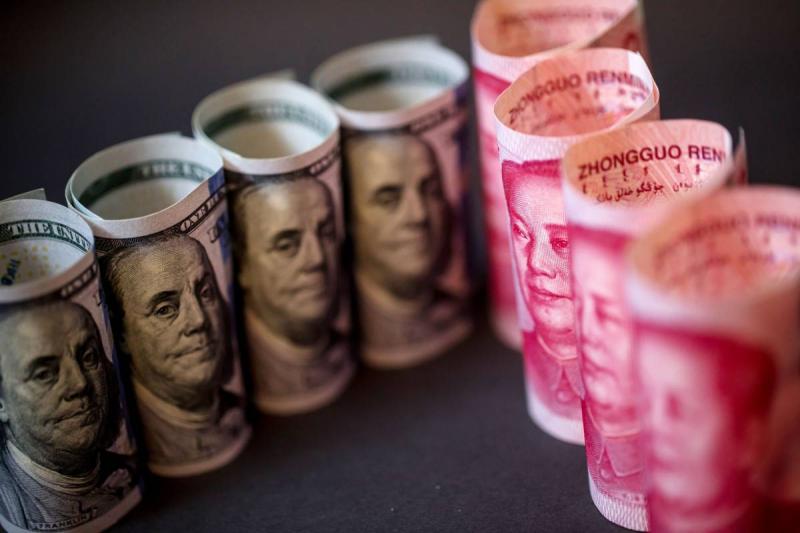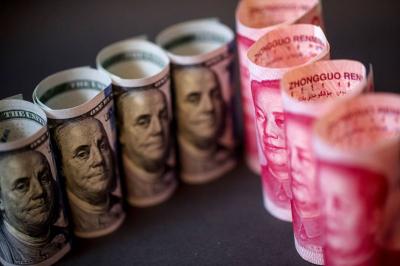It seems that the pandemic has not distorted global markets enough, as the Chinese regulatory crackdown unexpectedly adds unpredictability. So, what is the best way to invest during these strange times? Bloomberg News spoke with institutional investors managing a combined $3 trillion in assets to ask how they are navigating the economic disruption caused by unexpected recoveries and changing rules in China, which have frozen listings of companies on US stock exchanges and nearly decimated the online education sector.
Some are increasing allocations to hedge funds - reflecting a years-long decline - hoping that active management can chart a course through a landscape of COVID-19-related lockdowns and recoveries. Others are turning to undervalued stocks in Europe and India to avoid the regulatory spats between the US and China. Everyone advised caution and warned of a difficult recovery ahead. Here’s a look at their strategies.
**Temasek Holdings**
Managed Assets: SGD 381 billion ($283 billion)
Over the next twelve months, this massive state-owned investor from Singapore plans to focus on companies centered around digitization, e-commerce, cybersecurity providers, and sustainability, according to Najy Hamyia, co-head of their investment group. Recent interest has surged amid a growing wave of investors looking to make their portfolios greener. This is not entirely new; Temasek and others have invested billions in these areas for years. However, while some believe it has priced in fully, Hamyia stated there remains room for growth. Temasek is still optimistic about China in the long term, with bets in the country representing 27% of their portfolio. Hamyia spoke with Bloomberg in mid-July when China was demonstrating its ability to inflict short-term pain. Investments in Didi Global were deteriorating. Since then, the strength of online education providers has been stripped away, and tensions with US securities regulators have reignited. However, Hamyia expressed optimism that valuations of Chinese companies will rise over time, even if those companies cannot access US markets. A spokesperson later affirmed that Temasek will continue to invest in sectors including the future of consumption in China and beyond, stating, “There are other capital pools, like Asia for instance, that will seize the opportunity. So I wouldn’t say it necessarily affects the valuations. The mix of institutional investors in these stocks will change.”
**GIC**
Reported Managed Assets: "More than $100 billion," with an estimated $545 billion by SWFI
The Singapore Sovereign Wealth Fund (GIC) is also positive about China, partially due to how the country managed the COVID-19 crisis, according to CEO Lim Chow Kiat. He stated, “Chinese assets continue to deliver good income levels, especially regarding what are called advanced market valuations.” The company has a solid presence in China with a team in Shanghai seeking real estate deals and another team in Beijing looking for private equity opportunities, according to Chief Investment Officer Jeffrey Ganesan. He noted that the fund is delving into companies focused on sustainability and technology, paying close attention to "what geopolitics forces companies to invest in,” including new local supply chains worldwide. He added that some companies leading these trends have not been reclassified. Regulatory pressures in China, the US, and the EU have caused market volatility, creating buying opportunities for GIC. If Chinese companies cannot list in America - thereby excluding a significant number of potential investors - Kiat sees exchanges in places like Hong Kong and Singapore as "vital" alternatives. He stated, “We’re not necessarily going to deal with an American investor directly to take anything from their hands,” referring to purchasing stakes. “If prices drop and our expected yields on that asset increase and it becomes compelling relative to other things available to us, we will naturally look at it.”
**Future Fund**
Reported Managed Assets: AUD 197 billion ($144 billion)
The Australian Sovereign Wealth Fund has pulled back from China amid escalating tensions between the governments, according to Future Fund CEO Peter Costello. He mentioned during a conference call with journalists, “This is not because the government asked us to do it or anything like that, but we just thought about the difficulty of the situation, that we have to be prudent about sovereign funds.” Away from politics, Chief Investment Officer Rafael Arndt noted that economic conditions are currently poised for a sustainable rise in inflation — something that would be "very, very harmful" to returns given that interest rates are virtually zero. He said, “We are taking steps in our portfolio to prepare for that.” The fund is exploring how to allocate equities across value and quality strategies, having recently bought stakes in Tilt Renewables for running wind farms and Telstra's mobile towers. He remarked, "These are examples of the type of assets we expect to perform relatively better in that environment."
**Pictet Wealth Management**
Managed Assets: CHF 273 billion ($300 billion)
César Pérez Ruiz, Head of Information at Pictet Wealth Management, remains positive about Chinese markets, but advises investors to apply a higher risk premium and choose stocks listed in Hong Kong when possible. Away from geopolitics, hedge funds are back in favor. Ruiz states that the uneven recovery from COVID-19, along with volatility and sudden turns, means that macroeconomic factors are more significant than ever. He said, “For the first time in six years, we are optimistic about alternatives, and hedge funds are one of them.” Event-driven macro hedge funds - fueled by an increase in mergers and acquisitions - are currently seen as a viable way to anchor portfolios with negative correlations to other assets. While most of his peers view inflation as temporary, Ruiz believes it is more persistent than people realize, citing rising shipping costs, increased wages, and labor shortages as countries attempt to produce more essentials domestically. To find good picks that can endure various phases of cycles, he bypasses metrics like return on equity. He stated, “I’m studying sector by sector and seeing who has managed to keep higher gross margins,” using European tire manufacturers as an example of suppliers performing better as shipping costs eat into profitability of Chinese competitors.
**Norges Bank Investment Management**
Total Managed Assets: NOK 11.7 trillion ($1.3 trillion)
For Nicolai Tangen, CEO of Norges Bank Investment Management — a former hedge fund manager now running Norway’s massive sovereign investment tool for about a year — rising inflation could affect both bond holdings and the stock market. Due to its colossal size, it has limited choices but to wait for the crisis to pass. Despite plans to divest various assets over environmental, social, and governance concerns, Tangen told Bloomberg Television that these concerns are not necessarily reasons to cut back on investments in China, which constitutes 5% of its holdings. He stated, “We have significant stakes there, and we really believe in many of these business models,” using technology companies as an example.
**China Renaissance**
Managed Assets: $8.8 billion
Bao Fan, head of China Renaissance, is looking to support Chinese startups considered less susceptible to government scrutiny. For its latest fund, Huaxing Growth Capital Fund III, the firm has trimmed its online consumer investments and has no exposure to Chinese primary education companies focusing on curriculums. Smart industrial technology that can transform supply chains, contracts, and transactions are targeted, including autonomous driving technology providers. After already betting on NIO and Li Auto in healthcare, it selects companies providing early diagnosis and examination devices. The firm reports it has achieved an internal rate of return of 45% as of December and invested in 122 companies. The executive’s investment mission now focuses on growth-stage companies, investing in about 10 firms annually. He stated, “We are going through different times. As a private equity investor, it is essential to understand and anticipate these profound fundamental changes.”
**Lombard Odier (Private Bank)**
Client Assets: CHF 316 billion ($347 billion)
For Stéphane Monier, Chief Investment Officer at Lombard Odier, bank, automotive, and energy stocks should perform well over the coming months while European stocks are particularly trading at a discount to their US counterparts. It is expected that increased financing from foreign investors into regional stocks and rising vaccination rates could bolster growth in Europe in Q3. Long-term, the bank remains optimistic about China. Monier plans to increase the fund's holding in Chinese equities by one percentage point to 4% as regulatory disruptions subside — a figure not including indirect exposure to China through emerging market indices. He anticipates it will take six months for the storm to calm. “The People’s Bank of China will have a more accommodating stance. We don’t believe there will be a risk of monetary policy tightening in the near future,” Monier said. He added, “We believe a significant part of the required regulatory adjustments is now behind us.” While the increase in Chinese stocks could include US-listed Chinese companies through American Depository Receipts (ADRs), he sees this as “less significant” compared to those listed in Hong Kong and mainland China in the medium to long term. He prefers shares listed in China facing less governmental intervention, including banks, renewable energy, materials, and industrial stocks, while being cautious about technology, real estate, education, and healthcare.
**DWS Asia Pacific**
Managed Assets: €47 billion ($55 billion)
Looking for alternatives to China? Sean Taylor, Chief Investment Officer at DWS Asia Pacific based in Hong Kong, states the time has come to invest in select information technology service providers listed in India. The sales and profits of these companies are less reliant on domestic consumption or affected by lockdowns since their clients are often in Western markets. He noted, “They are undergoing reclassification compared to their Chinese and American peers as they are extremely cheap. As we see more recovery in India, it’s likely we will allocate more to financials and recovery plays.” Taylor remains relatively optimistic about some Chinese sectors in the long term. However, where Monier from Lombard believes it may take six months for Chinese regulations to stabilize to the point investors can see clearly, Taylor expects it will remain tricky for a longer period. He stated, “We thought it would fade by the end of this year, but I think it will carry on for another year or so.”




